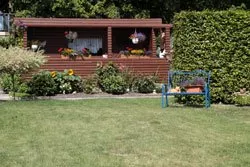A garden house is mainly used in summer. With the onset of cold weather, you maintain value and substance by winterizing it. Get the job done quickly with these 5 tips.

In summer, summer houses are often used for cozy barbecues with friends. Many garden owners also find their house an ideal retreat for the warm season. Here you can simply unwind and escape the stress of everyday life for a while.
In winter, however, such a garden shed is often used as a storage room. Garden chairs, garden tables and garden tools, but also plants are protected from the winter influences and stored indoors.
If the summer house is not adequately protected, there may be a nasty surprise in spring. It is therefore essential to protect the garden shed against the effects of the weather.
Work before winter
Tip 1: Check the garden house carefully
Before you say goodbye to winter, you should check your garden shed for possible damage. Is the roof still sealed? Does the gutter have a few cracks? Walls, windows and doors must also be checked. If repairs are necessary, they should be carried out as soon as possible. You never know how hard the winter will be. Even a small tear can quickly become larger in a harsh winter.
It is also advisable that wooden windows and doors are treated with a wood glaze, which protects the wood. You can also use a paint that is weather-resistant instead. There a no limits to imagination. Joints on windows and doors can be well filled with construction foam. Basically, this is a simple but effective step.
Tip 2: Turn off the water
To avoid major damage from water, it is very important that you turn off the water in good time and also clear all pipes. After the water has been turned off, you simply have to open all the taps and let the remaining water drain from the pipes. The faucets will then remain open until spring when the water is turned on again.
If you complete this taskIf you miss it, it can lead to freezing and bursting of the water pipes. This damage is not only annoying, but also often very expensive. For example, you can put antifreeze in the toilet for extra protection against freezing.
It is best to completely empty the rain barrels in front of or behind the house. If you leave them standing and the water in them freezes, the rain barrels will burst. Simple emptying saves a lot of money here.
Working during the winter months
Tip 3: Check regularly
It's also recommended that you check things out from time to time. Regular visits will enable you to spot small flaws and eliminate them if necessary. This avoids major repairs.
Tip 4: Remove snow from the roof
Especially when there is heavy snowfall, it is advisable that you regularly check that everything is in order. Heavy snow loads can quickly collapse your roof. Moisture can also move into the house faster. So quickly grab the snow shovel and clear the snow as quickly as possible.
Tip 5: Heat the garden house - is that necessary?
Whether you have to heat your garden house in between or bring the temperature to around 5 degrees Celsius depends on whether shrubs or plants in your garden house have to overwinter. Some shrubs and plants usually need some warmth. You can check whether your plants are affected in specialist books (see winter gardening guides).
Electric heaters or an oil radiator are very suitable for heating. The advantage is that the temperatures can be set and, above all, kept so constant. However, make sure that the garden house is equipped in such a way that you can install a radiator without hesitation. But there are also small condensing boilers with up to 2 kW and a single radiator, which are suitable for smaller rooms such as a garden shed.
Go into the garden shed from time to time and ventilate it well. This way you can avoid mold or mildew stains. You don't have to ventilate every day, but just think about it from time to time.
Special features of allotment gardens and allotment gardens
Allotment gardens or allotment gardens have a certain special feature - also in relation to winterizing. A special feature is that in late autumn, usually at the end of October at the beginning of November, the water is turned off at the main water supply. Often this willin the community and at the same time the water meters are read in the individual allotment gardens or plots.
As a user of an allotment garden, you must therefore adhere to the deadlines for turning off the water and cannot independently determine until when you still want to use the water. It is important for you that you open the water taps in the garden house as soon as the water has been turned off.
Since allotment gardens are often visited by burglars, especially in winter, it is advisable to make the windows with large boards, for example. This way you at least avoid broken windows.
The extent to which it is possible to heat the garden shed in an allotment garden in winter depends on various factors. Since every association has its regulations and there are also federal allotment garden laws (see here), you should obtain sufficient information in case of doubt in order to avoid damage and personal annoyance.